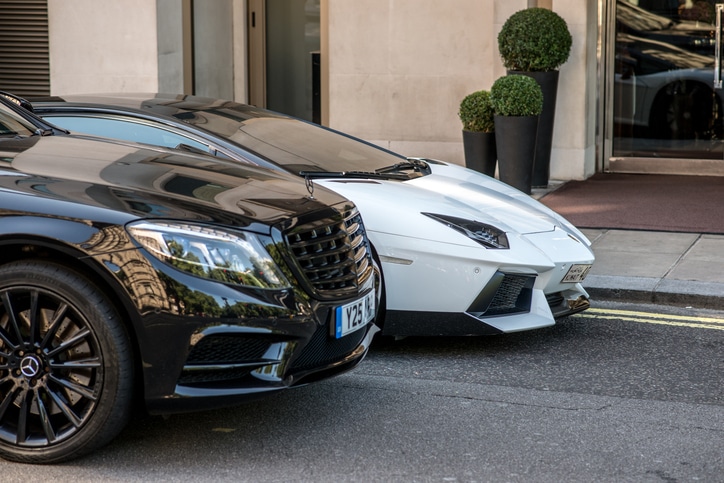If you’re considering buying a sports car, congratulations. It’s the ambition of many car lovers, and can be a really exciting purchase. Before you make the leap though, it’s worth considering a few points about the reality of buying and owning a high performance car. Here’s a few tips for you to help you make the right decision.
Use the links below to jump to the section you’re interested in:
Buying a Sports Car
It’s easy to fall in love with the idea of owning a sports car, but, before you make what could be one of the biggest investments of your life, there are a few questions you need to ask yourself.
Can You Afford to Buy and Maintain a Sports Car?
Firstly, and perhaps most important of all, is cost. Of course, if you’re buying a brand new supercar straight off the factory floor, it’s going to be pricey. But there are some cheaper options out there, even if you’re buying a brand new model. You can pick up a Mazda MX-5 for less than £20,000, and a Subaru BRZ for less than £30K. And, if you’re looking at the used car market there are some great deals to be had, with a 2006 Mercedes-Benz SL-Class available for around £10,000.
A high-performance engine brings greater running costs, including inflated insurance premiums and road tax, higher fuel consumption, and a bigger outlay on parts and maintenance, so you need to budget for these too. But it’s not all bad news. Sports cars are extremely popular on the used car market and tend to depreciate much less than other cars. So, as long as you pick wisely, your resale value should remain relatively high.
What Type of Sports Car Is Right for You?
Sports cars come in all shapes and sizes, from the fuel-friendly hot hatch to petrol guzzling powerhouses like the Ferrari 488. Simple things such as handling, driving position, visibility and noise levels are all different in a sports car, so you need to think long and hard before making a decision. But perhaps the biggest decision you’ll have to make when buying your new sports car is whether you want a closed-roof coupé or an open-roof convertible – here are a few pros and cons of each to help you decide:
- A coupé will give you better handling and a smoother, more comfortable ride. With no fixed roof, convertibles are not as structurally sound as a coupé, and as a result they’re more prone to “scuttle shake” and cabin noise.
- There’s also the issue of price. With a few exceptions, a convertible will usually cost more than a closed-roof coupé.
- If you’re driving a soft top or hardtop convertible, you’re going to have to think about the weather more. Roof materials and mechanisms have improved massively over the years, but with a convertible there’s always the risk of a leak.
- There’s also the interior to think about. With a convertible you’ll be exposing your seats, dash and dials to the elements, which over time could lead to faded surfaces and cracked leather.
But there’s a reason convertibles are so popular:
- A convertible gives you the best of both worlds. When the weather’s warm you can enjoy the sun on your face, and when the clouds darken you can simply put up your roof.
- You’ll also get a more exciting driving experience with the top down – you’ll hear the roar of the engine and feel the wind in your hair.
Ultimately, it comes down to personal taste, and while some prefer coupés for their better performance and handling, the differences are small, and it’s tough to beat the classic style and feel of a two-seater convertible.
What’s Best, a Hardtop or Soft Top Convertible?
If you’ve got your heart set on a convertible, you’ve basically got two options: a hardtop or a soft top. With a soft top you’ll be compromising a little on security, as the fabric hood’s a much easier target for criminals. You’ll also have to put up with more cabin noise with the soft top option, as well as poorer insulation and temperature control.
., Hardtop designs come with considerations tooFor one, the heavier mechanism of a retractable metal roof can have an impact on performance and fuel consumption, as well as using up more space, leaving less room for luggage. Plus, there’s not as much choice with a hardtop, with far fewer models on the market compared to cars with a fabric hood.
What Specs and Options Should You Look for in Your Ideal Car?
Next, you need to consider the specs. Choosing the right spec and options is a key factor when buying any car, but with a sports car it’s even more important. And we’re not just talking personal taste here. The trim levels, options and accessories can all affect the resale value of your new sports car, so if you’re thinking you’ll be selling your car in on a few years it’s worth doing your homework.
Sports cars hold their value well as a rule, particularly if you’re buying on the second-hand market, but, to increase your chances of getting good deal in when you sell it, you need to get the specs right. Certain engines and trim levels are more sought after than others, and this varies from model to model. The same goes for the options. The value of a sports car is often dictated by colour, and serious buyers will expect leather trim and a decent set of alloys too.
What’s the Best Option, a New or Used Sports Car?
Price usually influences whether you’re able to buy new or used, but if money is no object, a new model might be the better option. You’ll get the peace of mind that comes with a full factory warranty; you won’t need to worry about any hidden accident damage or potential service problems down the line, and you’ll get your pick of colour, trim and options.
On the downside, the moment you drive your brand-new car off the forecourt its value will start to drop. And watch out if you’re using a finance package, because if you have low monthly payments you might have a large final balloon payment at the end which you need to cover.
If, like most, you’re working with a limited budget, you’ll probably be going for a used car. You’ll get a wider range of options, with the added bonus that it will hold its value better than a new model. However, there are obvious pitfalls when it comes to buying a used car.
What Should You Look out for When Buying a Used Sports Car?
If you’re buying a used sports car from a dealer or private seller, you need to be extra vigilant. Compared to your average vehicle, a used sports car is far more likely to have been driven hard, so as well as carrying out all the usual checks – tyre wear, fluid levels etc. – there are a few other important things to look out for.
- Give the bodywork a proper once over. Odds are your future car has been driven at high speeds, so it might be more likely to have been involved in an accident. As well as obvious imperfections like dings and dents, look for tell-tale signs of repair, such as gaps in the panels and re-touched paintwork.
- Pay attention to the undercarriage of the car. High-performance vehicles are built low to the ground, making them much more susceptible to bottoming out on speed bumps and uneven terrain.
- If you’re looking at a soft top convertible, be sure to check the fabric carefully for any rips or holes and inspect the roof’s rubber seals and plastic screen for any damage.
- For both hard and soft top convertibles, make sure you test the mechanism thoroughly. There’s a lot of moving parts here, and you need to be confident everything is working as it should.
- On the test drive, be sure to put the car through its paces. Gear changes should be fluid and efficient, brakes sharp and responsive, and the ride should feel smooth and comfortable.
Caring for a Sports Car
Once you’ve driven your dream car off the forecourt, it’s up to you to make sure it stays in good condition, and due to the nature of sports cars, they may need a little more TLC than your average motor. Also, when sports cars do breakdown they’re usually more expensive to fix, so it’s always a good idea to pay extra attention to upkeep and maintenance.
Here are some simple things you can do at home to keep your sports car in prime condition.
- Keep an eye on your fluid levels. Check your oil, brake fluid, power steering fluid and coolant regularly. Use a coolant which offers protection against rust and corrosion, as well as extreme temperatures, so it’s safe when it’s sitting in the garage.
- Check your tyres. Driving at high speeds is going to put extra strain on your tyres, so taking care of the boots is essential. Regularly check tread depth, wear and pressures, and, for optimum performance, rotate the tyres every 5 – 8,000 miles.
- Keep it clean. Regularly washing and waxing your vehicle will not only keep it looking its best, but also help protect against corrosion and fading paintwork. Pay attention to the undercarriage and wheel wells. Debris from the road is a major cause of rust and corrosion, and your low-riding sports car is more vulnerable than most.
- Clean the hood regularly. If you have a soft top convertible, the fabric hood can be a real magnet for dirt and grime, which can ruin the fabric if you don’t clean it off. Use a quality hood cleaner and re-proofer to protect against the elements.
Getting the Most from Your Sports Car
Once you’ve bought your dream car, it’s time to enjoy it. Here are some exciting ways to get the most out of your new sports car.
- If you really want to put your car through its paces, book a track day. Track days have become extremely popular over the past couple of years, with big airfield venues like Elvington in Yorkshire and famous race circuits like Brands Hatch. Perfect for hitting those top speeds without fear of getting a ticket.
- Hill climbing is pretty popular with sports car owners. Similar to a track day , you’ll compete against fellow petrol-heads over a challenging uphill course with plenty of twists and turns. You don’t need a racing licence to take part, and all cars are welcome as long as they’re roadworthy.
- If you want to show off your new motor and meet fellow enthusiasts you might consider a car meet. Most major cities in the UK have car meets at least once a month, and the trend is growing every year. You’ll get a chance to exchange ideas with like-minded owners, and even buy and sell parts.
- Another option is to join an owners’ club. You can swap tips and ideas, learn about upcoming events and gain insight into your car’s make and model.
Prestone car maintenance products are tested in all extremes, so you can be confident your car’s in good hands. From brake fluid to coolant/antifreeze, discover our full product range at the homepage.



